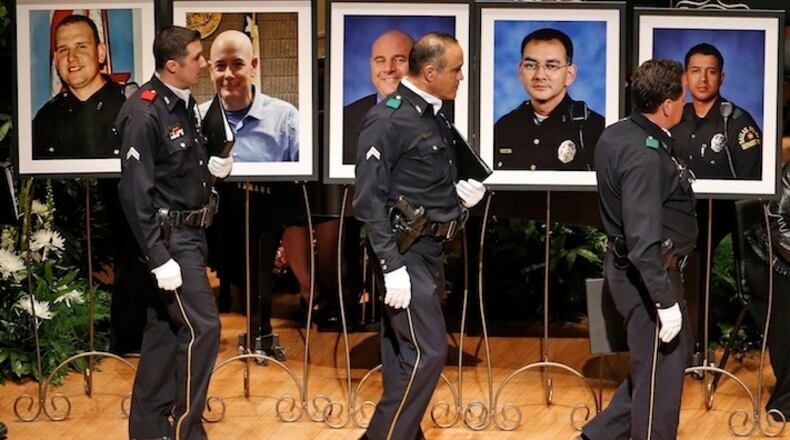WASHINGTON — After a long summer of violence, Congress has a big job on its plate: finding new ways to mend relations between police and African-American communities across the nation.
On Tuesday, the search led to Detroit, where a handful of members of the House of Representatives interrupted their seven-week summer break to meet privately with community leaders and law enforcement personnel.
"We are in crisis across the country," Washington state Republican Rep. Dave Reichert, a former sheriff, said at a news conference at the Theodore Levin U.S. Courthouse. "This isn't just a Detroit problem. It's not just a Seattle, Chicago, Baltimore problem. This is a United States of America problem, and the United States Congress needs to take action to support the efforts of all the local communities across the country to fix this problem."
The field trip to Detroit came as part of the House's new Policing Strategies Working Group, a team of 12 created last month in response to the murders of five police officers in Dallas.
Their assignment: Examine excessive force used by police, attacks on law enforcement officers and overall public safety issues linked to this summer's outbreak of killings.
"It is the most significant civil rights issue of our time," said Texas Democratic Rep. Sheila Jackson Lee.
Reichert, a sixth-term congressman, said members of the panel were under no illusions about the enormity of the task they faced.
"The wounds are deep and the rift is wide," said Reichert, who turned 66 on Monday and spent half of his life — 33 years — in law enforcement before joining Congress. "It will take time and hard work to regain the trust and civility that has been lost."
In a Congress criticized by many for its hyperpartisan dysfunction, members assigned to the working group said they hoped to lead by example. It comprises six Democrats from the Congressional Black Caucus and six Republicans.
"Our core job is to listen," said Minnesota Democratic Rep. Keith Ellison.
Reichert said the group's work must "begin and end by recognizing that we are all on the same team." After the Dallas shootings, he said that members of Congress needed to come together quickly, with people feeling that "America is crumbling and falling apart."
The panel, led by Virginia Republican Rep. Bob Goodlatte and Michigan Democratic Rep. John Conyers, kicked off its work last month with private meetings with community leaders and law enforcement officials in Washington.
In a joint statement then, Goodlatte and Conyers said "our nation's conscience has been rocked" by the summer of violence, including the fatal shootings of police in Dallas and in Baton Rouge, La., and the killing of two black men by police in Minnesota and Louisiana.
At the Detroit news conference Tuesday, Goodlatte said the panel would visit other U.S. cities, though no other trips have been planned.
He said that one consistent theme had emerged in Detroit: People want more federal resources for law enforcement.
"We certainly heard a lot about that," Goodlatte said, adding that the panel will have no power over Congress' purse strings, only making recommendations.
Reichert, however, said the panel must persuade Congress to come up with more money. He said that too many police departments were short-staffed and couldn't engage in community policing. That makes it impossible, he said, to build trust with minority communities, with officers showing up only for police calls.
Reichert, long regarded as a moderate on Capitol Hill, said Congress needed to spend more on policing and education and to help battle social problems such as homelessness and mental illness. He said the federal government must help police officers, who were forced to confront too many mentally ill criminals.
"I had my throat cut in the early '70s _ 45 stitches. A guy jumped me with a butcher knife," Reichert said at the news conference. "This is not a new problem."
After the violence of this summer, Reichert said the U.S. was now "in a very critical time in our history."
It's a message he hopes to hammer home in coming months.
"To me, this is life and death," Reichert said. "Police officers are now targets and are being ambushed and executed. I see this as a very urgent need."
About the Author
Keep Reading
The Latest
Featured


